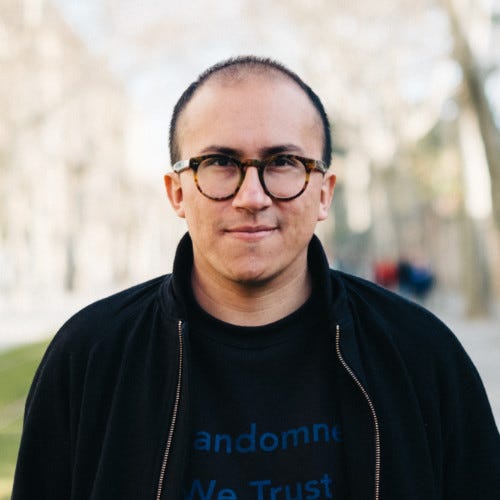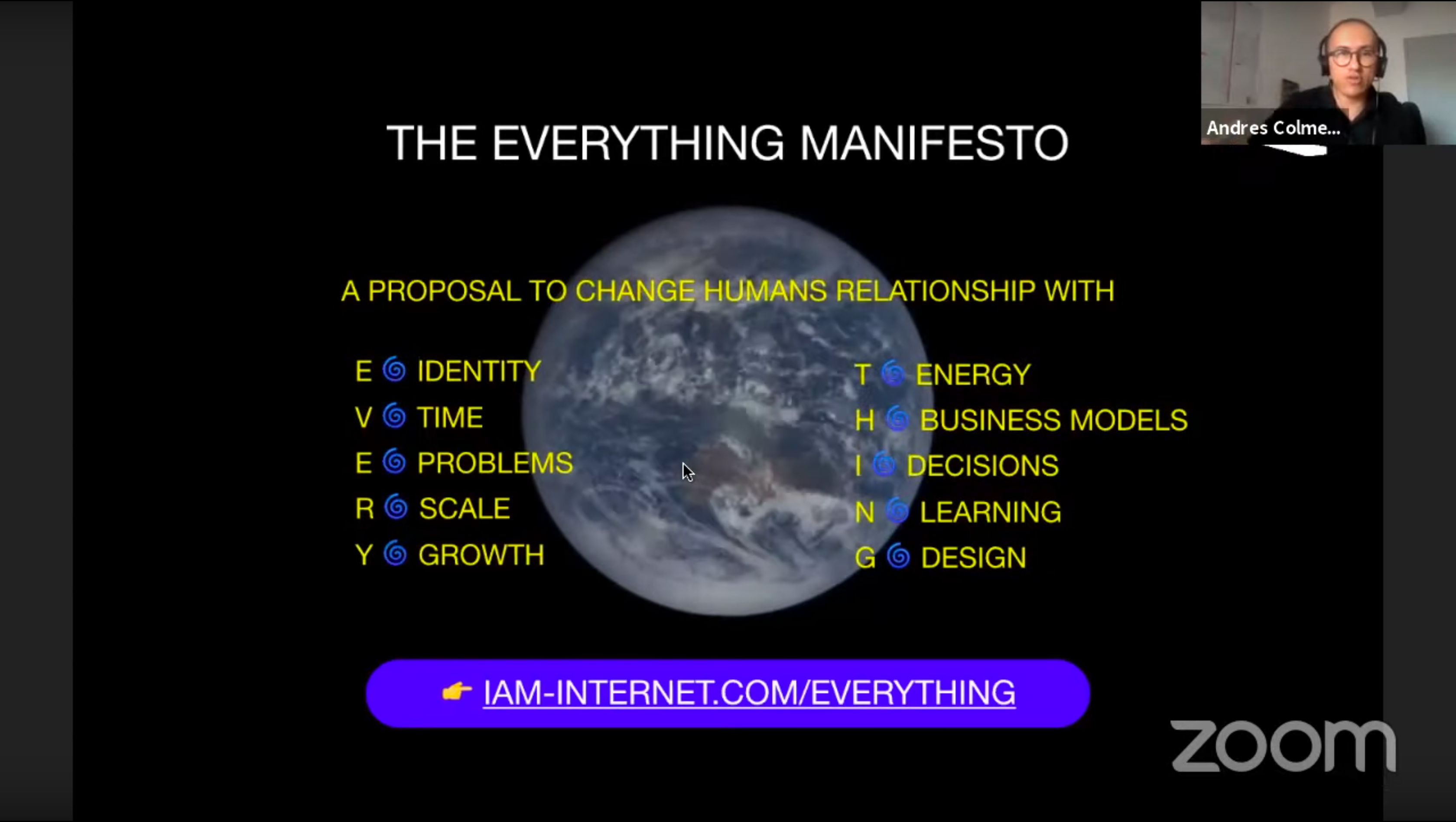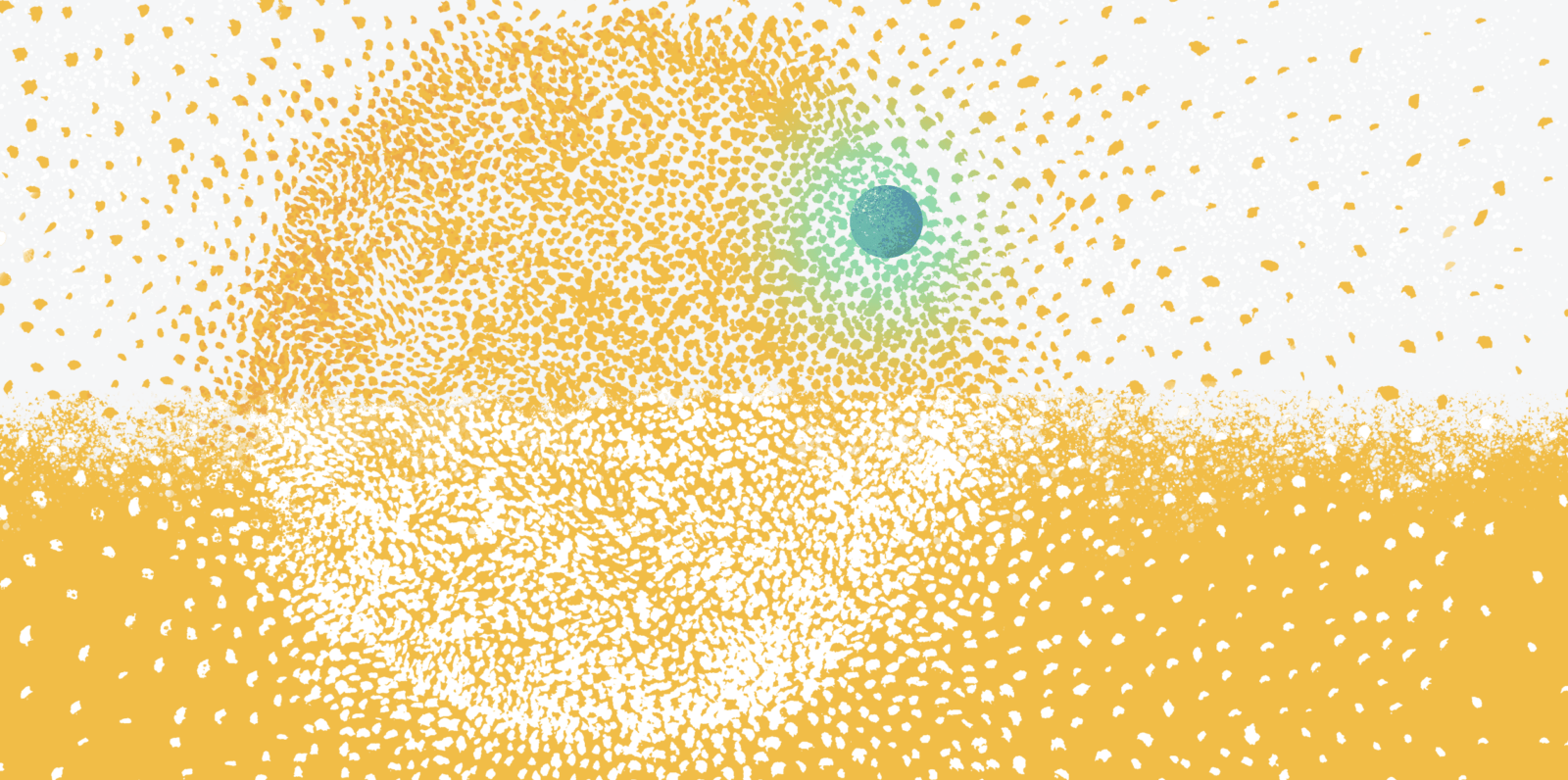Future Tense: “The Awakening” with Andrés Colmenares
Published in ATÖLYE Insights · 7 min read · September 22, 2020
An event series exploring plausible futures
Authors: Deniz Yazıcıoğlu, Engin AyazEditors: Melissa Clissold
This year, with our initiative ATÖLYE Academy, we launched the event series "Future Tense" in order to engage thought leaders from around the world to discuss pressing topics through a long-term thinking lens. In the first session, we hosted Noah Raford, the Futurist-in-Chief of the Dubai Future Foundation, the summary of which can be read here. Our second guest was designer, author, and urbanist Dan Hill; you can read about that event here.
For the third session of Future Tense, we hosted IAM co-founder and strategist, Andrés Colmenares. At the event, Andrés introduced to us the "Everything Manifesto," and carried out a live reading of "The Great Awareness," a short fiction story/reflection on the pandemic which he wrote for PROVISIONS.

IAM is an alternative think tank that is exploring and addressing the multidimensional implications of the digital economy and internet culture, whilst considering the future of the planet. In its own words, IAM "design[s] alternative learning experiences, tools, and platforms to change how the digital economy is changing Everything." Andrés co-directs IAM Weekend and We Internet, the annual gathering and transdisciplinary community for creative thinkers (and doers) learning collectively how to "internet" together, as well as how to address the current environmental emergency.
We've put together a summary of the highlights from Andrés' presentation, as well as some intriguing questions - which you can respond to under this post.
The Everything Manifesto: A thought experiment for the next billion seconds
Digital economy is changing everything. The Everything Manifesto, which is now the backbone of what IAM stands for, is a provocative thought piece uncovering the interdependencies between the planet and the internet. In Andrés's words, the manifesto consists of hypothetical questions "to open a multidimensional canvas we all can fill" and goes on to present some design tools that we can all use to address the multidimensional relationship of ourselves and the blue dot that we call our planet; our home.

The Everything Manifesto, co-authored by Andrés, uses "billions" as a scale to think about the relationship between the planet and big data companies such as Facebook and Google. In his presentation, Andrés underlined the fact that "scale matters even more when we define corporations as the largest big data extraction and publishing companies in the world." Only by thinking within the scope of the same measuring unit of "billions" can we can fully grasp the impact of these corporations.
"Scale matters even more when we define corporations as the largest big data extraction and publishing companies in the world."
Data is the new oil
Andrés argues that big tech companies are extracting value by digitizing our attention, actions, our faces, and our networks. According to Andrés, "big data extraction is becoming as profitable as oil extraction" and just like oil extraction and consumption, it is also exacerbating climate change and feeding into income inequality. This, by now, is an argument gaining momentum with the current antitrust hearings in the US, the implementation of The General Data Protection Regulation (GDPR) in the EU from 2018 onwards, as well as new regulations being implemented in Turkey.
To demonstrate his view, Andrés shared this video showing how companies like Facebook, which are disguised as social networks, are actually just extracting data from its users and turning this data into profit.

Using the scale of "one billion" helps us level the understanding of the scale of big tech companies and our planet; as in billionaires, multi-billion dollar tech companies, billions of people on earth. And the fact that, according to a recent report, humanity collectively spends 63 billion seconds every day on average using mobile phones, truly allows us to step back and perceive our world differently.
Following this way of thinking, Andrés asks the following hypothetical question:
What happens when billions of humans, Spend billions of seconds using billions of mobile devices Concentrating money and power In the hands of a few billionairesWho run corporations that manufacture Billions of devices made of rare minerals Used to extract and process billions of data points In data centers that consume Billions of Kilowatt-hours of electricity Generating billions of tons of carbon emission?

Questioning the relationship between money, power, and energy, the following question that we posed to the participants during the breakout rooms can bring us to a moment of introspection:
In what ways we can use the internet and digital technologies to shift our collective focus from profit towards social welfare?
Interestingly, the most popular answer was a quote from the famous American writer Audre Lord:
"You can't use the master's tools to dismantle the master's house."
In our context, this quote suggests that the solution lies in giving users the power to control their own data, take an active role in designing new tools, and creating ethically sound regulations.
Looking at the future
Some interesting insights also emerged during the discussion session from a Mentimeter (mentimeter.com) exercise. The first question we asked was "How aware or concerned are you about the environmental implications of the digital tools you use every day?" On a scale of 1–5, this question scored a 3.3 (1 being "not aware", 5 being "very aware"). This reply shows us that the awareness level for the environmental impact of the use of our digital technologies and the internet is still not widespread enough. Even some of the most basic actions we now carry out each day - such as "asking google," have an impact on the environment.
Did you know that "one Google search consumes the same amount of energy as turning on a 60W light bulb for about 17 seconds?" (fullfact.org)
In fact, according to a Paris-based think tank, the Shift Project, which looked at nearly 170 international studies, our use of digital technologies has actually caused more CO2 emission than the aviation industry (Reset). This brings us to the disparities of the news coverage about global warming. Before the COVID pandemic, frequent flyers and budget airline brands were under tremendous scrutiny for their carbon footprint. Were people aware that their use of digital technologies holds more of the blame? We think not.
Another insight that emerged, which ignited some interesting conversations, was that the audience does not necessarily think that the internet will be inclusive and democratic in the future, nor do they think it will be completely corporate and fragmented. To form your own opinion we are leaving some interesting articles here so that you can delve deeper into the topic:
- The "splinternet" is already here - Techchrunch
- Noam Chomsky: Social media is "undermining democracy" - Salon
- Web 3.0: The decentralised web promises to make the internet free again - The Conversation
- A World Without Privacy Will Revive the Masquerade - The Atlantic
Closing remarks and further questions
Andrés posed this interesting question at the end of his presentation:
"What if we collectively decided to spend our time, attention, and money and use data in a different way?"

We leave you with this question, and a few others below, to try and ignite these conversations within your own communities.
- In what ways can we, as responsible citizens, use the internet and digital technologies to shift our everyday life choices from a "profit-centered" mindset to focus on "societal wellbeing" as the ultimate growth metric?
- What role do futurists, designers, and strategists have right now to shift the mindset surrounding the politics of waking up?
We are very excited to read your responses and reflections to these pressing topics in the comments section below. To watch the event yourselves you can go over here to our YouTube channel.
See you next time!
If you have any feedback on our Future Tense series or associated matters related to futures design, please contact ATÖLYE Co-founder Engin Ayaz (engin@atolye.io).
If you are looking for ways to help your teams build systems that will allow inclusive and effective means of collaboration and co-creation, please contact Mert Çetinkaya (mert@atolye.io) the interim Director of ATÖLYE Academy. For ATÖLYE Academy's events, programs and workshops, including the upcoming Future Tense sessions' details, you can subscribe to our newsletter at this link.
Finally, if you are interested in conversing about the emergent challenges of your organization during this global pandemic, please contact our Studio Director Bengi Turgan (bengi@atolye.io).
